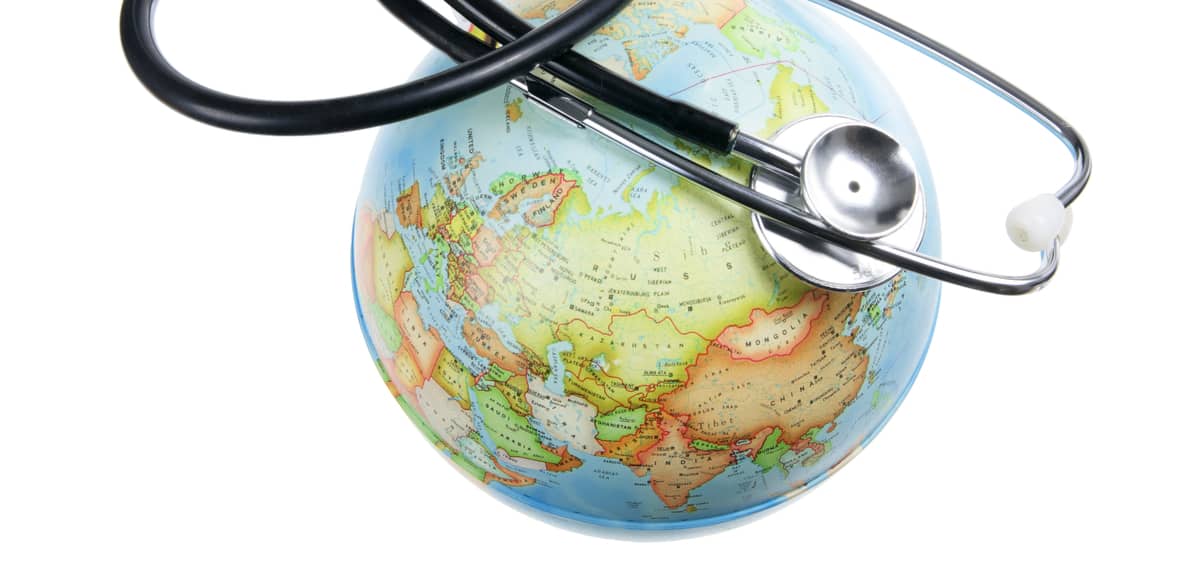Oxford researchers' index shows international healthcare systems becoming more universal
Friday 18th Mar 2022, 2.11pm

Data derived using the new index also identified that countries with more universal healthcare systems had better health outcomes, lower inequality in life expectancy and even a lower likelihood of conflict.
The new index was developed by ODID’s Professor Diego Sánchez-Ancochea and doctoral student Tobias Schillings and was launched last month in a United Nations Development Programme (UNDP) Special Report on Human Security.
Data…identified that countries with more universal healthcare systems had better health outcomes, lower inequality in life expectancy and even a lower likelihood of conflict
The COVID-19 pandemic has prompted new interest in universalising healthcare provision, with the recognition that the exclusion of certain groups can put whole populations at risk. But definitions of what constitutes universal healthcare vary.
Narrow definitions focus exclusively on the extent of coverage; broad definitions, derived from the Scandinavian welfare state model, envisage the provision of generous, tax-funded benefits to the whole population, based on the principle of citizenship.
The index reveals that healthcare universalism has increased over time, with the world Healthcare Universalism Index (HUI) value increasing by nearly 20% from 0.395 to 0.472 between 1995 and 2017 – seemingly contradicting dominant narratives around the marketisation of healthcare and the declining role of the state.
However progress has been variable; 80 countries substantially improved their HUI, while 37 countries experienced a deterioration during the time period.
In addition, the gap in healthcare universalism between developed and developing countries has widened on average. Progress in countries in the Global South has been too slow to enable them to catch up with the Global North. In absolute terms, the average HUI increased by 0.061 and 0.058 in low and lower-middle income countries respectively over the period, compared to an increase of 0.095 and 0.086 in upper-middle and high income countries. In many countries in the Global South, lack of generosity remains a particular problem.
The gap in healthcare universalism between developed and developing countries has widened…Progress in countries in the Global South has been too slow to enable them to catch up with the Global North
Norway, Japan and Sweden come top of the index, with HUI values above 0.9; meanwhile Afghanistan, Bangladesh, Equatorial Guinea and Nigeria are at the bottom, with values below 0.1.
The researchers went on to explore linkages between universal healthcare and three key threats to human security: infectious diseases and wider health outcomes; poverty and inequality; and violence and conflict.
For the first category, the researchers found that the level of healthcare universalism was positively associated with life expectancy at birth and negatively correlated with infant mortality. For example, in 2017, a 1% increase in healthcare universalism was associated with an increase in life expectancy of 0.3 years and a reduction in child mortality of 0.7 deaths per 1,000 live births across all countries. The association was even stronger for countries in the Global South.
In terms of the relationship to inequality, the researchers found that a 1% increase in healthcare universalism was associated with a 0.36 percentage point reduction in inequality in life expectancy. When the authors explored the impact of particular dimensions, they found a particularly strong association with changes in coverage – a 1% increase in coverage was associated with a 1.9% inequality reduction in the Global South and a 3.5% inequality reduction in the Global North.
To assess the final category, the link to conflict, the researchers…found that, based on the latest available year, a 1% increase in universalism was associated with a reduction of 0.11 (or 1.36%) in the homicide rate
To assess the final category, the link to conflict, the researchers measured the association with the homicide rate and the Global Peace Index, a composite index measuring various forms of conflict.
They found that, based on the latest available year, a 1% increase in universalism was associated with a reduction of 0.11 (or 1.36%) in the homicide rate and a reduction of 0.013 (or 0.63%) in the Global Peace Index.
The authors suggest this association might be driven by the impact of universalism on social cohesion and nation-building, as well as its relationship to inequality.
The (HUI) uses a multidimensional approach developed by Professor Juliana Martínez Franzoni and Professor Sánchez-Ancochea in their 2016 book, The Quest for Universal Social Policy in the South: Policies. Actors, Ideas and Architectures. It combines three aspects – the extent of coverage; the generosity of provision; and equity in terms of both generosity and access – to measure universalism of healthcare in 195 countries between 1995 and 2017.
Find out more:
Schillings, T and D Sánchez-Ancochea (2021) ‘The Role of Healthcare Universalism in Advancing Human Security’. Background paper for the Special Report on Human Security, United Nations Development Programme, Human Development Report Office, New York
UNDP (2022) New threats to human security in the Anthropocene: Demanding greater solidarity, United Nations Development Programme, Human Development Report Office, New York

